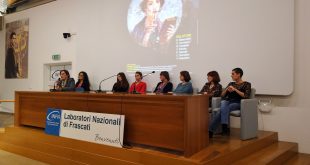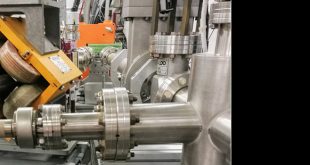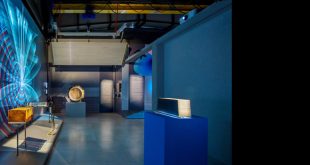The Frascati National Laboratories offer to 5 undergraduate or graduate students the opportunity to carry out research in an experimental group during the summer.
Read More »News
OPENLABS 2019 – Moving into Science
OpenLabs – Moving into Science Saturday 18th of May 2019 INFN – Frascati National Laboratories Free entrance from 9,30 a.m. to 7,30 p.m. to every scheduled event
Read More »LNF on the big screen with the movie “Conversazioni Atomiche”
Special mention for the docu-film “Conversazioni atomiche” (Atomic Conversations) by Felice Farina in the framework of the Nastro d’Argento Award 2019.
Read More »International day of Women and Girls in Science at LNF
There were many – and all of them brilliant and passionate – women researchers at Frascati Laboratories, participating in the day of reflection on the role of women in Science.
Read More »INTERNATIONAL MASTERCLASS 2019
From the 11th to the 15th of March 2019, LNF will host the 15th edition of IPPOG-International Particle Physics Masterclass, the stage addressed to students in their last year of high school.
Read More »LNF becomes a Training Centre accredited by the Regione Lazio
By deliberation n. G01670 of the 18th of February 2019 the Regione Lazio has recognized Frascati National Laboratories the qualification of Certified Training Institution.
Read More »Renewed BTF: now open the call for proposals
After a one-year shutdown for building a second beam-line, the Beam-Test Facility has resumed operations on the completely rebuilt BTF-1 line in July 2018.
Read More »ESPP2020 moving towards Granada
The more than 160 contributions to the European Strategy for Particle Physics 2020, produced by Research Institutes, Laboratories, collaborations and groups of researchers active in high energy physics and related technologies, are now freely accessible. That is crucial to drawing up the document outlining the sector perspectives in the years ahead
Read More »Farewell to Pio Picchi
Pio Picchi, a very unique scientist, passed away. With his original contributions, especially in the field of detector development, he had been marking the history of INFN experimental physics for 50 years.
Read More »The Visitor Centre opens its doors to the public: find out the 2019 dates
Registrations opened for the guided tours at the LNF Visitor Centre – on every Thursday afternoon
Read More » INFN-LNF Laboratori Nazionali di Frascati
INFN-LNF Laboratori Nazionali di Frascati









